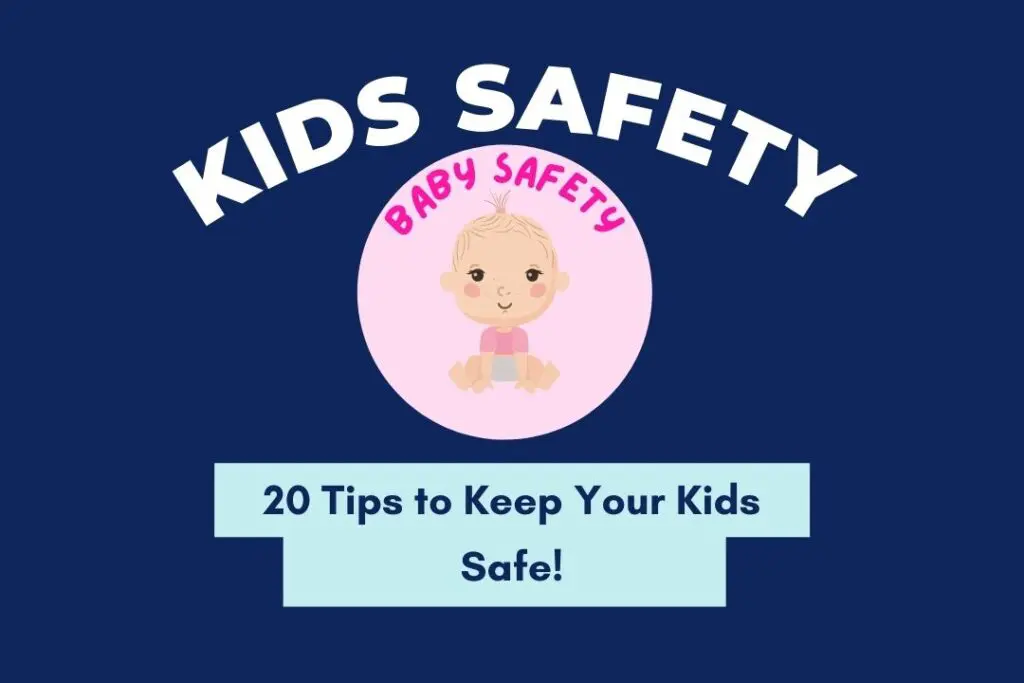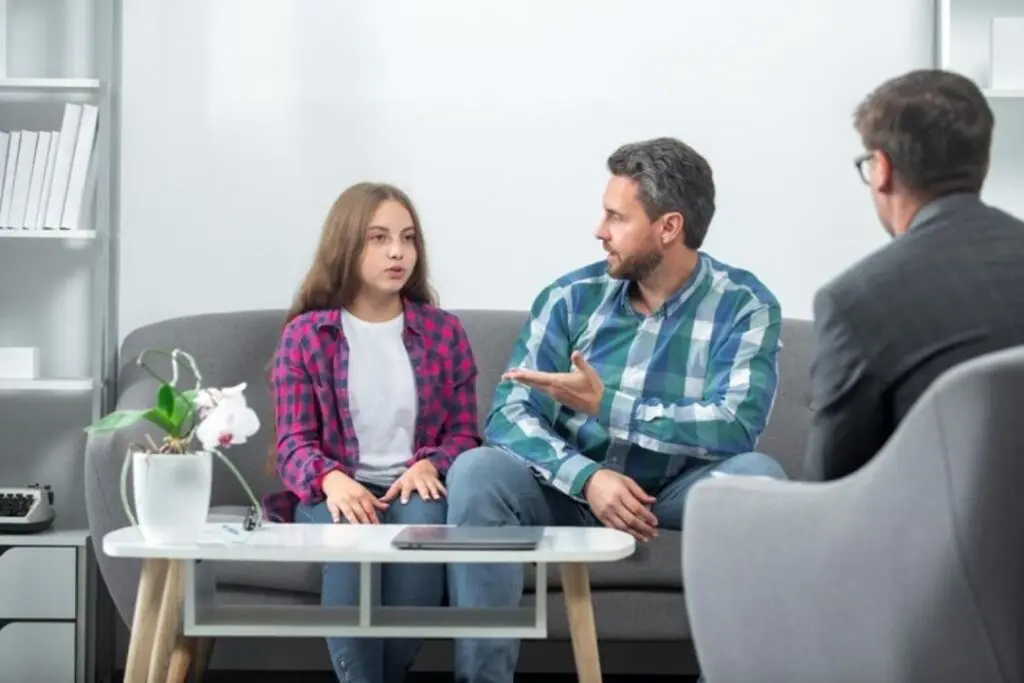As a parent, you want to do everything in your power to keep your children safe. Unfortunately, there are no guarantees in life, and kids can be injured or kidnapped even when you take all the necessary precautions. That’s why it’s important to have a safety plan in place and to be as vigilant as possible. In this blog post, we will discuss 20 tips about kid safety that will help keep your kids safe!
Some of the tips may seem obvious, but it’s important to review them all and make sure you are doing everything possible to keep your children safe. Engage with your kids about these safety tips and empower them to know what to do if they find themselves in a dangerous situation.
Here are 20 tips to keep your kids safe:
1. Teach your kids their full name, address, and phone number
It’s important to teach your kids their full name, address, and phone number in case they ever get lost or separated from you. Make sure they know how to dial 911 in an emergency, too. By teaching your kids these simple safety steps, you can help keep them safe in any situation.
Kids should also know about online safety. Teach them not to give out personal information like their full name, address, or phone number to anyone they don’t know online. Help them create strong passwords for their devices and accounts, and explain why it’s important to keep those passwords private. With your guidance and support, your kids can stay safe both offline and online! Kids should also know about online safety.
2. Have regular family discussions about personal safety
. Kids need to know what to do if they’re ever in a situation where they feel unsafe. Teach them to trust their instincts and always go with their gut feeling. If something doesn’t feel right, it probably isn’t. Let them know that it’s okay to say no, even to an adult. And most importantly, teach them that they can always come to you no matter what.
If you have regular family discussions about personal safety, your kids will be more likely to come to you if they ever find themselves in an unsafe situation. They’ll know that they can trust their instincts, and that it’s okay to say no – even to an adult. Most importantly, though, they’ll know that they can always come to you no matter what. So don’t be afraid to have those discussions – they could one day save your child’s life.
3. Make sure your kids know how to dial 911 in an emergency
In an emergency, every second counts. That’s why it’s so important to make sure your kids know how to dial 911. If they can’t speak, make sure they know their address and can tell the operator where they are.
Teach your kids how to call 911 and when to do it. Review the steps with them often. And remember, even if they’re old enough to dial 911 on their own, always be there to help them in an emergency. After all, Kids Safety is always a top priority!
4. Teach your kids what to do if they get lost in a public place
If your child ever gets lost in a public place, it’s important to have a plan in place so they know what to do. Here are some tips to help keep your kids safe:
- Teach them to always stay with you in public places and never wander off.
- If they do get separated from you, tell them to find a security guard or police officer and stay with them until you’re reunited.
- Help them memorize your phone number and address in case they need to ask someone for help finding their way home.
- Keep recent photos of your child on hand in case you need them for identification purposes.
5. Never leave young children alone in the car, even for a minute
Kids can overheat quickly, even on a mild day. Make sure to keep an eye on your kids when they’re outside playing. If they start to look tired or sweaty, bring them inside and give them a break. Drink plenty of fluids and dress in cool, loose clothing. Kids should also wear sunscreen with SPF 15 or higher. Apply it about 30 minutes before going outside, and reapply every two hours or after swimming or sweating. Keep an eye out for heat stroke signs like nausea, headaches, dizziness, confusion, fast breathing, seizure, or fainting. If you see any of these signs in your child, call 911 immediately. Heat stroke is a medical emergency that can be fatal if not treated right away.
6. Keep an up-to-date photo of your kids on your phone
It’s a good idea to keep an up-to-date photo of your kids on your phone. That way, if they ever go missing, you have a recent photo that you can show to people who might have seen them.
Make sure to take a new photo every few months, or whenever your child has a major change (like a haircut). And be sure to keep the photo in a place where you can easily find it if you need it.
If you have more than one child, it’s also a good idea to keep photos of each child separately. That way, if one of them goes missing, you’re not showing people a photo of the wrong child.
7. Explain to your kids what constitutes as appropriate touching
Kids need to know that there are some places on their bodies that are private, and that no one is allowed to touch them there without their permission. These places include the inside of their thighs, their bottoms, and their chests. If someone tries to touch them in these places, they should say “no” firmly and walk away. They can also tell a trusted adult about what happened.
It’s important for kids to understand that not all touches are bad. There are lots of good kinds of touching, like hugging, high-fives, and holding hands. Good touching makes people feel happy, safe, and loved. Kids should only allow people who make them feel good to touch them in private places.
8. Kids Safety: Teach your kids how and when to say “no”
It’s important to teach your kids how to say “no” for their own safety. Here are some tips on when and how to say “no”:
- If someone tries to touch them in a way that makes them feel uncomfortable, they should say “no.”
- Moreover, if someone asks them to do something that they don’t want to do, they can say “no.”
- If they’re feeling scared or unsafe, they can always say “no.”
Remember, it’s okay for your kids to say “no” – even if it means saying no to you. They need to know that their safety and wellbeing is always more important than anything else.
9. Keep an eye on your kids at all times when they are in a public place
There are many dangers that can be lurking, so it’s important to be vigilant. If you see something suspicious, report it to the authorities immediately. By working together, we can keep our kids safe. Thanks for doing your part!
What are some of the dangers you’re most concerned about when it comes to your kids safety? Let us know in the comments below! And don’t forget to share this post with others so we can spread the word about keeping our kids safe.
Kids Safety is very important and should be a number one priority for all parents. There are many dangers in today’s world, and it is up to us to protect our children from them.
10. Don’t post photos of your children on social media without their permission
It’s a violation of their privacy and it could put them at risk.
If you must post photos of your children on social media, make sure you’re only sharing them with close friends and family who you know will respect their privacy. And never post anything that could identify them or where they live.
Kids safety is important. Social media is a great way to keep in touch with friends and family, but it’s important to be careful about what you share. So think twice before posting photos of your kids online.
11. Discuss internet safety with your kids regularly
Did you know that the average age of a child getting their first smartphone is now ten years old? This means that kids are increasingly exposed to the internet at younger and younger ages. As a parent, it’s important to have regular discussions with your kids about internet safety. Here are a few tips:
- Teach your kids about cyber bullying and how to stand up to it.
- Explain the importance of privacy and why they should be careful about what personal information they share online.
- Show them how to spot fake news and scams.
- Help them understand why cyber predators exist and how to avoid them.
By teaching your kids about internet safety, you can help them navigate the online world more safely and confidently. So don’t wait – start the conversation today!
12. Monitor your child’s internet usage and limit screen time
As a parent, it’s important to be aware of the dangers that come with the internet. Kids can easily access inappropriate content, and they may not understand how to stay safe online.
That’s why it’s important to monitor your child’s internet usage and limit their screen time. By doing so, you can help keep them safe from harm.
There are a few simple steps you can take to monitor your child’s internet usage:
- Keep the computer in a common area of the house so you can see what they’re doing online.
- Set limits on how much time they can spend online each day.
- Talk to them about the importance of staying safe online.
13. Keep communication open with your kids about any concerns they have
If they don’t feel comfortable talking to you, there are other adults they can talk to. Kids need to know that it’s okay to come to you with anything that’s going on in their lives.
It’s also important to teach kids about stranger danger and how to stay safe when they’re out and about. Kids should know what to do if they ever feel lost or scared. You can find more tips on keeping your kids safe.
14. Be aware of who you are leaving your children with and do background check if necessary.
Kids are the most innocent and helpless creatures on this earth. It is our responsibility as parents to ensure their safety and well-being. There are many ways to do this, but one of the most important is to be aware of who we leave them with.
We all want to believe that the people we entrust our children to are good, kind, and safe. But unfortunately, that isn’t always the case. There have been too many stories in the news lately about children being hurt or even killed by caregivers who were supposed to be protecting them. This is why it’s so important for us to do background checks on anyone who will be spending time alone with our kids.
15. Trust your instincts – if something doesn’t feel right, it probably isn’t
. Kids are especially vulnerable to predators and kidnappers, so it’s important to be extra vigilant when they’re around. Here are some tips to help keep your kids safe:
- Teach them to never go anywhere with a stranger, no matter how nice they seem.
- Make sure they know their full name, address, and phone number in case they need to call for help.
- Keep an eye on them at all times when they’re out in public – never let them out of your sight.
- If you can’t be with them, make sure someone you trust is responsible for watching over them.
By following these simple tips, you can help ensure your kids stay safe from harm.
16. Have a family safety plan in place in case of an emergency.
Kids are curious by nature and sometimes they can get themselves into situations that may be harmful. As a parent, it’s important to have a safety plan in place in case of an emergency.
There are many things you can do to help keep your kids safe. One of the most important things is to educate them about safety. Teach them what to do if they ever find themselves in a situation where they feel unsafe.
Another thing you can do is create a family safety plan. This should include things like who to call in an emergency and where to meet if you get separated. Practice this plan with your kids so that they know what to do in an emergency situation.
17. Review the safety plan with your kids regularly
Kids are natural born explorers. It’s in their DNA to touch, taste, and experience everything around them. Unfortunately, this can sometimes lead to dangerous situations.
As a parent, it’s important to review your safety plan with your kids on a regular basis. This will help them be prepared for any potential hazards they may encounter. Here are some tips to help you get started:
- Teach your kids about common household hazards like electrical outlets and poisonous cleaning products.
- Show them how to safely use things like knives, scissors, and power tools.
- Explain what to do in case of an emergency, such as a fire or tornado.
- Practice evacuation routes and other safety procedures regularly.
18. Keep a list of emergency contacts handy
In case of an emergency, it’s important to have a list of emergency contacts handy. This way, you can easily get in touch with the people who need to know what’s going on. Here are some tips for keeping a list of emergency contacts:
- Make sure to include the names, phone numbers, and email addresses of your child’s school or daycare.
- Add the contact information for your child’s doctor, dentist, and any other medical professionals they see regularly.
- Include the phone numbers and addresses for any family members or close friends who live nearby.
- If you have a babysitter or nanny, be sure to include their contact information as well.
19. Teach your kids what to do if they encounter a stranger
It’s important to teach your kids what to do if they encounter a stranger. You never know when they might come across someone who is up to no good. Here are a few tips to help keep your kids safe:
- Teach them to trust their instincts. If something doesn’t feel right, it probably isn’t.
- Tell them to never go off with a stranger, no matter what promises are made.
- Let them know that it’s okay to be assertive and yell for help if they feel like they’re in danger.
- Practice role-playing with them so they know how to react in various situations.
20. Have a code word that your family can use in case of an emergency
This can be helpful if your child is ever in a situation where they need to get away from someone.
Make sure to pick a code word that is easy for your child to remember, but not something that would be easily guessed by someone else. You can also have more than one code word, and each family member can have their own.
If you have young children, it’s also important to teach them what to do if they ever feel lost or separated from you. Make sure they know their full name, address, and phone number so they can easily identify themselves to authorities. It’s also a good idea to give them a list of safe places they can go if they’re ever in trouble.
Conclusion
Now that you know some of the top tips for keeping your kids safe online, it’s time to put them into practice. Be sure to talk with your children about internet safety and how to stay safe while they are browsing the web. And most importantly, be there to help guide them and answer any questions they may have. As always, if you need additional support or want more advice on keeping your family safe online, our team is here to help. Stay safe out there!





